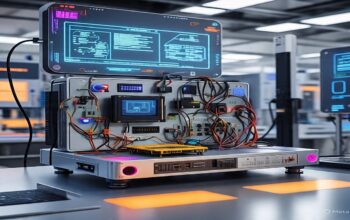Threats have become more complex and difficult to detect in today’s rapidly changing cybersecurity world. AI in cybersecurity has become a potent instrument for real-time threat detection, prevention, and response.
Businesses may proactively defend against cyber threats using AI cybersecurity solutions rather than waiting for an attack to occur. This article will teach you how artificial intelligence is shaping cybersecurity in the future, provide examples of actual AI-powered cyberattacks, and highlight crucial AI cybersecurity certification programs to improve your statistics.
Covered Contents
ToggleHow Hackers Use AI for Cybercrime
Although AI is a powerful tool for cybersecurity, hackers are using it for cyberattacks. Here are a few instances of some of the most destructive AI-driven cyberattacks:
AI-generated phishing emails:
Cybercriminals employ AI-driven phishing to deceive consumers into divulging personal information by crafting unrealistic phishing emails that mirror conversations.
Deepfake-Based Attacks:
Deepfake technology is being used to pose as executives in audio and video calls to obtain appropriate access to illegal fraudulent actions involving business structures.
AI-Powered Malware:
To bypass conventional firewalls and antivirus software, hackers are developing self-learning malware techniques that adjust to the current environment.
Autonomy Hacking Robots:
Robots powered by AI search the internet for weaknesses, which makes it simple for hackers to launch immediate attacks with little effort.
Research Paper on Artificial Intelligence in Cybersecurity: What Experts Say
The nature of AI in risk awareness, intrusion blocking, and cyber resilience has been thoroughly examined in instructional research, if you’re looking for in-depth cybersecurity research studies. Important findings from recent artificial intelligence research studies on cyber protection include:
● AI anomaly detection can detect cyber threats with 99% accuracy simultaneously when trained on real-world attack datasets.
● Deep analysis and machine learning versions can detect 0-day attacks that traditional methods typically miss.
● AI-based fully automatic danger insight enhances accident response and cuts reaction cases through utilization as a whole to ninety %.
Viewing AI in cybersecurity research papers may provide insightful fact-based perspectives for anyone interested in academic commentary.
AI Cybersecurity Certification: Advance Your Career in AI-Driven Security
As AI transforms the cybersecurity business, experts in AI cybersecurity
certification are in excess demand. Below are some of the outstanding certification
programs that will make you become an expert in AI-driven protection solutions:
1. Certified Artificial Intelligence Security Specialist (CAISS):
This certification, offered by the Cybersecurity & Infrastructure Security Agency (CISA), focuses on AI-based cyber opportunity detection and tool analyzing applications in protection.
2. Microsoft Azure Security Engineer Associate Certified
Professionals who get this Microsoft certification are better equipped to avoid cyberattacks and navigate common AI-driven cloud environments.
3. Specialized in AI, the Certified Ethical Hacker (CEH)
Security professionals may stay ahead of cybercriminals by using this software solution, which is made available through EC-Council and teaches AI-based, lucid hacking techniques.
4. IBM Certification in AI-Powered Cybersecurity
Network defense, endpoint security, and threat intelligence AI tools are the main topics of this IBM certification.
Acquiring qualifications in AI-based safety is a smart step if you wish to grow professionally in AI cybersecurity.
Artificial Intelligence in Cyber Security Projects: How to Design Defense Systems Using AI
Would you like to enjoy a hands-on? You can work on artwork over these interesting AI-related cyber security commitments:
Intrusion Detection System (IDS) Driven by AI
Create a fully functional, AI-driven intrusion detection system that uses video to alert community website visitors to questionable sports activity and blocks unauthorized access.
Phishing Detection Tool with Automation
Use natural language processing (NLP) to create a collaborative AI-powered tool that recognizes and stops phishing emails. An AI-Powered Malware Analysis Instrument
Create an AI variant that analyzes malware activity automatically to help security analysts spot and eliminate threats more quickly.
AI-Powered Cyber Threat Intelligence Platform Develop a real-time opportunity intelligence tool that collects and analyzes worldwide cyber opportunity data.
These AI in cybersecurity duties provide practical insights into how artificial intelligence
strengthens digital safety.
AI Cybersecurity Risks: Challenges and Limitations of AI Security
Though AI in cybersecurity provides many advantages, there also are threats and alarming scenarios, which include:
● False Positives – AI occasionally identifies legitimate sports activities as threats, leading to futile disturbances.
● Concerns regarding Data Privacy – AI safety technology needs large databases, bringing troubles regarding personal privacy.
● Adversarial AI Attacks – Hackers are misleading AI models to make incorrect protection options.
● Exorbitant Implementation Costs – AI-enabled protection solutions require ingenious investments.
Understanding AI cybersecurity risks allows corporations to place themselves into a better
position for safety functions at the same time as leveraging AI’s full functionality.
AI Cybersecurity Solutions: Future-Proofing Your Security
Strategy
To combat emerging cyber threats, organizations desire to implement AI cybersecurity solutions, which include:
● AI-Based Endpoint Security – Guards devices against malware and
Unauthorized obtaining of appropriate access to the appropriate.
● AI-Powered Firewalls – Utilizes AI to identify and block emerging cyber
threats.
● AI-Driven Security Automation – Minimizes response time and enhances
incident management.
By implementing AI cybersecurity solutions, companies can gain a proactive safety
stance and remain ahead of cybercriminals.
Conclusion
AI in cybersecurity isn’t necessarily the future—it’s winning. From halting
AI-driven cyber attacks to current hands-on AI cybersecurity tasks, AI is
transforming virtual defense.
FAQ: AI in Cybersecurity
What is AI-powered cybersecurity?
AI-powered cybersecurity through artificial intelligence (AI) and devices getting to know
(ML) to find, avoid, and react to cyber attacks in real-time. It improves
safety by executing danger detection, reading styles, and enhancing incident
reaction.
Will AI automate cybersecurity?
Yes, AI processes many cybersecurity responsibilities, including threat detection, incident reaction, and fraud defense. But human specialists are even desired for strategic choice-producing and dealing with complex threats.
How can one utilize AI as cyber defense?
AI enhances cyber defense through leveraging figuring out danger, responding in an automated way, fraud detection, strengthening authentication, and enhancing security analysis. It supports groups to remain ahead of new cyber threats
.
Can I apply AI and cyber protection?
Indeed, AI and cyber security can be combined through utilizing the use-powered protection technology, AI chance detection, biometric authentication, and AI-higher Security Operations Centers (SOC) to raise digital protection.



2 thoughts on “AI-Powered Cybersecurity”